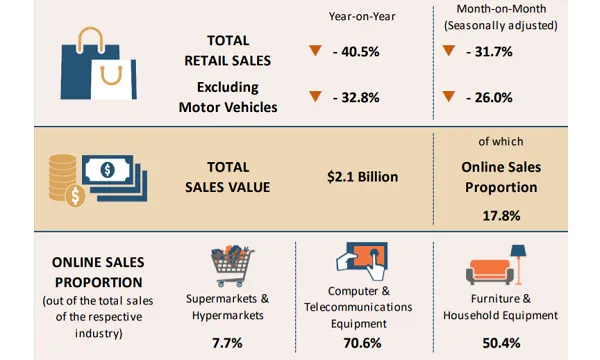
Singapore's retail sales plunged 40.5% in April
Rising online usage is not expected to counter the decline in other clusters in the next few months.
Singapore’s retail sales have crashed 40.5% YoY in April amounting to $2.1b in value as all segments continue to record double-digit declines, according to data from the Department of Statistics (SingStat). Retail sales excluding motor vehicles fell 32.8% over the same period.
Barnabas Gan, economist at UOB, noted that April’s sales value figure is only half compared to $4.2b in December 2019. On an MoM basis, retail sales slid 31.7%.
Online retail sales made up an estimated 17.8% of the total retail sales value in April, led by computer & telecommunications equipment (70.6%), furniture & household equipment industries (50.4%) and supermarkets & hypermarkets (7.7%).
“Online sales as a share of total retail sales surged to a record high of 17.8%, since data was available as of 2018,” Gan said. “A silver lining perhaps, can be gleaned from the retail sales data: the evident rise in online sales demand will likely encourage retail stores to actively incorporate IT and digital solutions to supplement their businesses. We expect the demand for IT and digital solutions to increase in the coming months, driven by the provision of government incentives, and the need to adapt in these unprecedented times.”

Overall, department stores led the plunge in sales as it plummeted 87.8% YoY in April, followed by watches and jewellery, wearing apparel and footwear by 84.6%. Both occurrences were attributed to the closure of physical stores for most of the month. Likewise, motor vehicles sales crashed 77% YoY, no thanks to the closure of car showrooms and suspension of COE bidding.
Meanwhile, sales of supermarkets and hypermarkets surged 74.6% over the same period, whilst mini-marts and convenience stores inched up 10.7% YoY.
Gan added that retail sales growth is likely to contract in a double-digit fashion for May and June, given most retail sales are still closed during phase one of SIngapore’s reopening. “Some
reprieve may be seen given the rise in online sales and the increased demand for consumer necessities in the coming months, although growth in these sectors is likely inadequate to offset the decline in other retail clusters.”
As for food & beverage (F&B) services, sales similarly fell 53% YoY in April as all establishments are operating on a takeaway or delivery basis. The turnover of restaurants and food caterers plunged 66.9% and 59.8%, respectively. Sales of cafes, food courts and other eating places and fast food outlets declined 45.5% and 28.6%, respectively, during this period.



















 Advertise
Advertise


